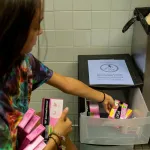Before the pandemic, Chantal Alison-Konteh, an 8th grade teacher, noticed that her students would sometimes sneak a few tampons and pads from the school bathrooms — not only for themselves, but also for their siblings, mothers or caregivers at home.
New York is only 1 of 4 current states where public schools provide free menstrual products. And even so, Alison-Konteh has heard students and parents claim that school bathrooms still had machines charging 25 or 50 cents for products.
During the pandemic, Alison-Konteh worried for her students. What are young menstruators going to do without access to period supplies at school? she wondered. But Alison-Konteh, who left her teaching job to run Her Village, a nonprofit that works to supply people with period supplies and other hygiene products, also knows the problem is global.
“If someone cannot afford food, if they cannot afford to feed themselves, which is the most basic need, they cannot afford diapers, they cannot afford period products. They cannot afford hygiene items,” Alison-Konteh said. “It’s a domino effect.”
The issue of inaccessible period supplies has only been made more dire during the pandemic. To mark the nation’s second annual period poverty awareness week, advocates for menstrual equity and legislators are pushing for revised education on reproductive health that includes menstrual health, and they want approval of increased access to period products — including the removal of taxes — for students, incarcerated individuals and those who are experiencing homelessness.
A new study released this week by Kotex showed a 35 percent increase in period poverty since 2018 in the United States; around 2 in 5 people who menstruate struggle to purchase period products due to a lack of income, according to Alliance for Period Supplies. Additionally, 1 in 5 low-income menstruators report missing work, school or similar commitments due to a lack of access to menstrual products.
“They don’t have sufficient funds to get period supplies, and therefore stay home from school,” said Eva Marie Carney, the founder of the Kwek Society, which helps educate and distribute menstrual products primarily to Native American youth. “When you understand that, you have to conclude that it cannot be this way.”
Schools have sometimes stepped up. In 2018, California and Illinois became the first states to give public school students access to free menstrual products. New York and New Hampshire followed and now also offer free products. But with school closures for the last year, many students lost that guaranteed safety net. Those closures also often coincided with women leaving the workforce at the highest rates during the pandemic — putting a financial strain on many families and making it harder to pay for menstrual products, many experts told The 19th.
And even before the pandemic, many people had found the costs of these products extremely inaccessible.
In the United States, 30 states still enforce the “period tax,” also referred to by experts as the “tampon tax,” which deems and taxes menstrual products as luxury goods. Because of this tax, menstruators are estimated to spend an extra $150 million on menstrual products a year. For Alison-Konteh, that extra cost is personal.
“I can even recall being in college and needing to go buy tampons, and then always calculating, because I was a broke college student, ‘OK, I have this amount of money and I know it costs this much, how much is the tax going to be,’” Alison-Konteh said.
Because many states categorize period products under luxury items, many state prisons do not offer them freely like they would other hygiene products like bathroom soap. Thirty-seven states still have laws that make those in state prisons pay for a limited access of menstrual products.
Earlier this year, Rep. Grace Meng, a Democrat from New York, introduced the Menstrual Equity for All Act, which would target the accessibility problem for menstrual products in myriad ways, including helping states use federal grants to make menstrual products free in public schools, providing incarcerated individuals access to free menstrual products and requiring Medicaid to cover the cost of these products.
There are also 210 bills on the horizon filed by 36 states targeting legislation related to menstrual hygiene — many of which aim to include menstruation products among the free hygiene materials found at incarceration facilities and schools. Other bills also target the educational aspect: Georgia’s House Bill 54 and California Assembly Bill 775 aim to expand health education in schools to include the full scope of reproductive health, including menstruation.
Education and access have to be spoken about in conjunction with each other, said Jennifer Gaines, the program director at Alliance for Period Supplies, a nonprofit at the center that helps provide menstrual products in bulk to communities that need it nationally.
“You can’t talk about period poverty without talking about stigma,” Gaines said. “So let’s talk specifically with students who can’t afford the product and don’t talk about it with anybody. And if they get a stain on their pants and then their peers may be making fun of them that can cause shame and guilt.”
Over half of the population can relate to the discomfort, anxiety or awkwardness of having to leave a social event and slide a tampon or pad up their sleeve. It has been ingrained in many to hide the process, as if making menstruation invisible is protecting someone. Alison-Konteh’s students, for instance, often used the word “marshmallow” as a code word for a tampon or pad.
Experts say this stigma has directly related to legislators’ inability to include menstruation products within laws that relate to labor, business and health care. In a press conference earlier this month on period poverty hosted by the Desai Foundation, Jennifer Weiss-Wolf, a leader in menstrual equity and vice president at the Brennan Center for Justice at NYU Law, said it is not about having specific period-related laws but having basic human laws reflect the experiences of people with periods.
“We have the right to say that menstruation is part of our existence and how laws can do better by that,” Weiss-Wolf said in the press conference. “And how they can do better by all of us.”
For many menstruators, and particularly people of color, there is an increased stigma when it comes to becoming an “adult” and the ability to get pregnant, said Ashlie James, executive director of Atlanta Glow, a group that also works to distribute hygiene products to primarily kids of color. This sense of fear takes away from the actual physical needs of menstruating people, James said.
“It’s just sort of one of those forbidden subjects,” James said about speaking about periods in general. “No one said it was forbidden … it’s just like we’ve all decided going back centuries that this is just sort of this unclean thing that we don’t talk about.”
Alison-Konteh said her mother had her period for five months before understanding what was happening to her body; no one had told her it was a normal part of reproductive health.
“I couldn’t even imagine having my period for that long without having one adult tell me what the hell is happening to me,” Alison-Konteh said.
Globally, the stigma persists even more. In India, where Megha Desai — founder of the Desai Foundation, which packages menstrual kits for those in India and advocates for revised policy here in the United States — focuses a lot of her outreach, 71 percent of girls don’t know what their period is until the day they get it and over half do not use a menstrual pad during their period. A lot of myths about periods remain abroad and here, Desai said.
“In America, my favorite myth is that if you go into the ocean when you have your period you’re going to get attacked by a shark,” Desai said. “But these myths can potentially have long term debilitating impacts on the way you see yourself, whether you value yourself, and what you have access to in some communities.”
While advocates and some policymakers call for the passage of bills that will make period products more accessible, they also focus a lot of their work on breaking the stigma and normalizing menstruators’ experiences.
The priority, James said, is “educating our service population, as well as other populations, so they are aware of the resources that are available, so that they’re not reduced to suffering alone.”
Ultimately, advocates fight for an equal playing field so all can go to school and work without fearing they will embarrass themselves because they cannot access menstrual products.
“If we can help provide products free of charge to the communities that need them, we are able to support their academic success and potential and ability to to be more self-sufficient economically,” James said.





